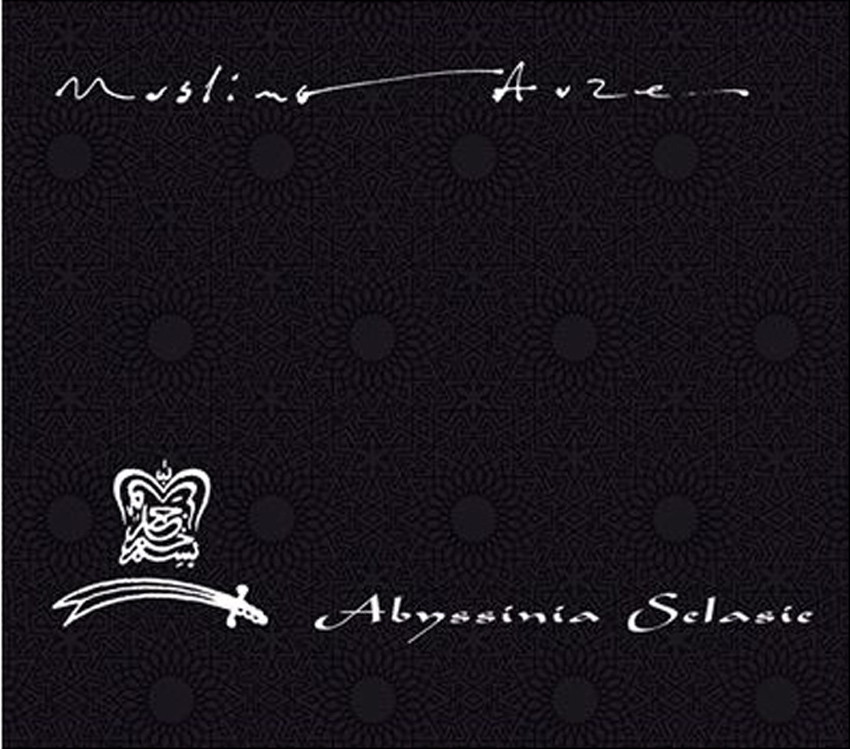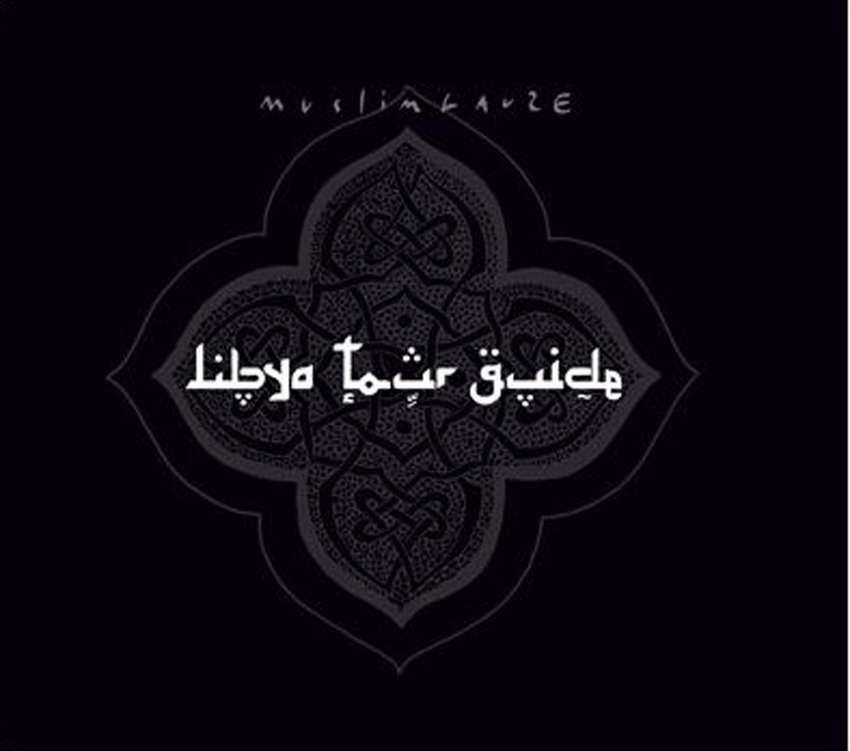Muslimgauze, "Abyssinia Selasie" & "Libya Tour Guide"
 Staalplaat’s Muslimgauze Archive Series has been nothing if not totally perplexing and erratic in both quality and content, but this latest pair of releases easily stand among the series' most quixotic and self-cannibalizing entries yet.  On the one hand, there is Abyssinia Selasie, a truly excellent and (debatably) previously unreleased 7-song EP that has been inexplicably stretched into 15-song album by ambitiously ballsy and redundant repetition alone.  One the other hand, there is the previously released Libya Tour Guide, which originally surfaced as part of the limited edition Tandoori Dog (1998) box set.  Granted, not many people have that set (I certainly do not) and there is some new material added, but Libya is far too half-baked (even by Muslimgauze standards) to warrant any kind of reissue at all.  I love Bryn Jones's work as much as anyone, but no one needs to hear such an unpolished avalanche of sketches and rough ideas, as a few one- or two-minute flashes of brilliance are not nearly enough to sustain an album.
Staalplaat’s Muslimgauze Archive Series has been nothing if not totally perplexing and erratic in both quality and content, but this latest pair of releases easily stand among the series' most quixotic and self-cannibalizing entries yet.  On the one hand, there is Abyssinia Selasie, a truly excellent and (debatably) previously unreleased 7-song EP that has been inexplicably stretched into 15-song album by ambitiously ballsy and redundant repetition alone.  One the other hand, there is the previously released Libya Tour Guide, which originally surfaced as part of the limited edition Tandoori Dog (1998) box set.  Granted, not many people have that set (I certainly do not) and there is some new material added, but Libya is far too half-baked (even by Muslimgauze standards) to warrant any kind of reissue at all.  I love Bryn Jones's work as much as anyone, but no one needs to hear such an unpolished avalanche of sketches and rough ideas, as a few one- or two-minute flashes of brilliance are not nearly enough to sustain an album.
In general, it is usually a very good sign when a Muslimgauze Archive release is said to originate from a tape in which Bryn Jones had actually made it to the "writing down song titles" stage.  That indicates that the tape in question was probably destined to be an actual Muslimgauze album at some point, but never quite got the chance.  In a perverse way, that rule-of-thumb proved to be correct yet again here, but the reason Abyssinia Selasie never got released is a bit suspicious: as indirectly noted by an alert Discogs user, only two of these songs are actually "new" (possibly even fewer than that).  For example, three songs already appear on Syrinjia (1998) with the same names, while a version of "Abyssinia Selasie" turns up on that same album with the title "Holy Man."  Other significant parts of these songs also appear on Baghdad and possibly Nommos’ Return (I regrettably could not confirm that one). Consequently, the best way to look at Abyssinia Selasie is as a dub album culled from Syrinjia-era material.  Of course, Syrinjia itself is already a dub-influenced album, so things have gotten very "meta" very quickly.  Adding to the chaos is the fact that every song on Abyssinia appears twice (in seemingly identical form), except for the title piece, which appears in no less than five(!) incarnations of varying similarity.
Ignoring all that, however, Abyssinia Selasie is still an excellent album.  For one, the endlessly recurring title piece is one of Muslimgauze's most fun moments, combining a lazily funky bass line with all kinds of clattering and echoing dub reggae effects and electronic bleeps.  "Benzedrine Wallah" is similarly delightful, rolling propulsively along with a deep, blooping pulse and a crackling vocal melody.  The more subdued and ominous "Negative" is yet another highlight, but otherwise every single song on the album boasts an appealing groove and plenty of nice dub-wise touches.  Also, all uncharacteristically seem perfectly fleshed-out and complete.  As a result, I actually did not mind hearing them all again a second time, even if it that is a totally weird and inexplicable sequencing decision.  In short, I have absolutely no idea why Abyssinia Selasie exists or why it exists in the crazy form that it does, but I find myself loving it in spite of myself solely because it is all absolutely top-shelf material.

Sadly, the opposite is largely true for Libya Tour Guide, though it gets off to an interesting start with "Lalique Gadaffi Jar," which derails a fairly likable groove with obnoxiously shrill horns and disruptive electronic blurts.  In a weird way, it kind of sets the tone for the rest of the album, as Libya seems to be the place where Jones worked out a thankfully brief fascination with loud blurts.  They do not appear in every song, but they certainly do appear a lot.  Like, to an obsessive degree.  In fact, at least four or five songs appear to exist solely to be backdrops for annoying skwonks.  They are not good songs either.  In fact, it is legitimately difficult to imagine any piece being lazier than "Great Satan Shadow," as it is literally nothing more than a backward tambura or sitar loop and an endlessly repeating one-note electronic bloop that a toddler with a synth could likely replicate with ease.  Curiously, that complete non-event clocks in at over four minutes while seven considerably more inspired pieces all clock in at under two.  That situation basically summarizes everything that is wrong with Libya: it feels like a dumping ground for finished songs that were not good enough to wind up elsewhere and great ideas that never quite made the leap into songhood for one reason or another.
That is truly lamentable, as there are some stellar snippets and no one has helpfully stopped forward yet on Discogs to tell me if they have turned up in more complete form elsewhere.  Being a Muslimgauze fan can be quite exasperating sometimes.  In any case, "Benghaze Hotel" is (almost) amazing, transforming the Muslimgauze aesthetic into a sexy disco thump that tragically lasts only a minute.  Alas.  So close.  "Moving Further into Land" is yet another would-be classic, resembling some sort of misguided lo-fi stab at a floor-filling club banger, but not quite sticking around long enough to go anywhere.  Jones was a lot of fun when he purposely made totally wrong-headed dance music.  At least I hope it was purposely–I liked some bad music in the '90s too.  A lot of Libya sounds like an awful lot like an inept and overexuberant techno DJ making a rough pass at a Muslimgauze remix.  As for the rest, it is generally a collection of half-successful experiments ("East of Tarabulus") and a smattering of pleasantly hypnotic loops ("Down Chad" and "Goodbye and Never Come Back").  Unfortunately, there are 22 songs here and it is almost never the good ones that stick around for longer than a minute or so.  Consequently, Libya is a real slog of an album that will probably only appeal to completists with extremely dubious judgment.
 



